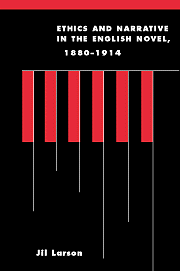Book contents
- Frontmatter
- Contents
- Acknowledgments
- 1 Ethics and the turn to narrative
- 2 Victorian history and ethics: anxiety about agency at the fin-de-siècle
- 3 Emotion, gender, and ethics in fiction by Thomas Hardy and the New Woman writers
- 4 When hope unblooms: chance and moral luck in A Laodicean, The Mayor of Casterbridge, and Tess
- 5 Oscar Wilde and Henry James: aestheticizing ethics
- 6 Promises, lies, and ethical agency in Joseph Conrad's Under Western Eyes
- Afterword
- Notes
- Bibliography
- Index
4 - When hope unblooms: chance and moral luck in A Laodicean, The Mayor of Casterbridge, and Tess
Published online by Cambridge University Press: 22 September 2009
- Frontmatter
- Contents
- Acknowledgments
- 1 Ethics and the turn to narrative
- 2 Victorian history and ethics: anxiety about agency at the fin-de-siècle
- 3 Emotion, gender, and ethics in fiction by Thomas Hardy and the New Woman writers
- 4 When hope unblooms: chance and moral luck in A Laodicean, The Mayor of Casterbridge, and Tess
- 5 Oscar Wilde and Henry James: aestheticizing ethics
- 6 Promises, lies, and ethical agency in Joseph Conrad's Under Western Eyes
- Afterword
- Notes
- Bibliography
- Index
Summary
How arrives it joy lies slain,
And why unblooms the best hope ever sown?
– Crass Casualty obstructs the sun and rain,
And dicing Time for gladness casts a moan …
These purblind Doomsters had as readily strown
Blisses about my pilgrimage as pain.
Thomas HardyGambling is not a vice, it is an expression of our humanness … You play, you win, you play, you lose. You play.
Jeanette WintersonEssential to any study of the ethics of Hardy's fiction is an understanding of chance and luck – personified in his poem “Hap” as the “purblind Doomsters”: “Crass Casualty” and “dicing Time.” Yoking such apparently contradictory concepts as luck and morality raises difficult, unsettling questions about moral responsibility. Philosophers who make the unequivocal Kantian claim that “morality is secure against the luck-sensitive issue of how things chance to turn out” have been challenged in recent years by Bernard Williams, Thomas Nagel, and others who insist on a place for luck in our conception of ethics. Attention to the issues involved in this debate can lead us to a more precise way of thinking about the role of luck in the ethics of Hardy's fiction, just as attention to Hardy's narratives can provide us with subtler, more detailed examples of moral luck than those in the philosophical discussions. Hence, while moral philosophy can help us to read Hardy, such a reading in turn helps to validate the contested idea of moral luck.
- Type
- Chapter
- Information
- Ethics and Narrative in the English Novel, 1880–1914 , pp. 64 - 92Publisher: Cambridge University PressPrint publication year: 2001



